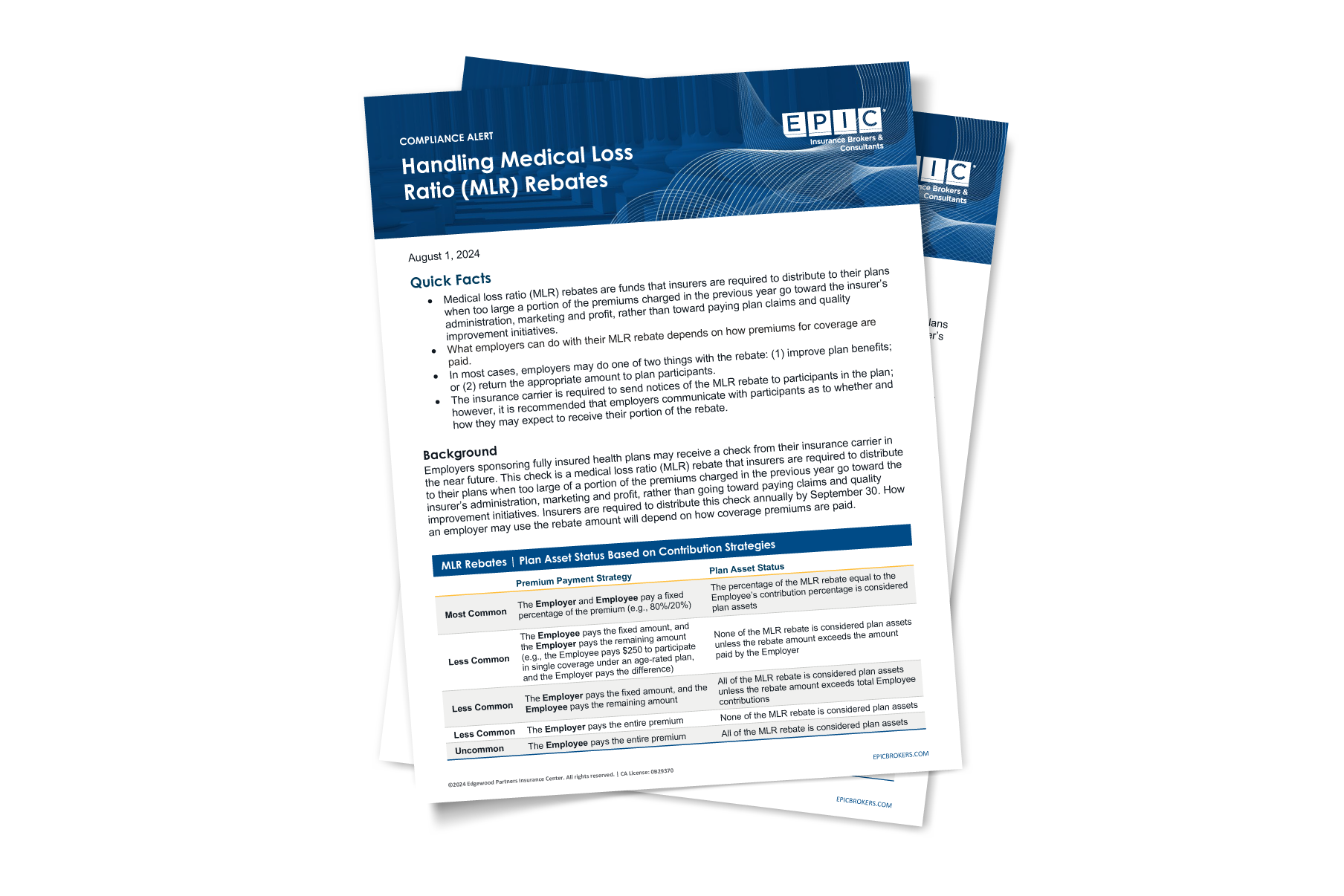Let our team help you navigate the ever-changing benefits compliance landscape each month. Check out this month’s latest alerts, additional updates, and resources hot off the press:
Employee Benefits Compliance Alerts
This month’s Compliance Matters newsletter provides a comprehensive review of the following topics. To obtain your copy, please use the form below to download.

- Special Compliance Alert: Employer Reporting Improvement Act
- Federal Court Dismisses Johnson & Johnson Fiduciary Breach Lawsuit
- Proposed Changes to the HIPAA Security Rule
- Departments Provide Clarifying Guidance on Gag Clause Prohibition Attestations
- San Francisco HCSO Top-Off Payments Due February 28
- 2025 State Regulation Series: California’s Behavioral Health Initiative
- Employee Benefits Litigation Series: Employer Alleges Fiduciary Breach Against TPA
- Employee Benefits Litigation Series: Sun Life Class Action Settlement
Download this month’s alerts
Additional Updates & Resources
Reminder | Telehealth Relief Not Extended into 2025
On December 21, 2024, “The American Relief Act, 2025” (“the Act”) became law, resulting in the avoidance of a federal government shutdown. The Act did not contain an extension of the relief contained in the 2023 Consolidated Appropriations Act, which permits plan sponsors to offer telehealth plans at no cost alongside a high deductible health plan (HDHP) without impacting HSA eligibility. Therefore, for plan years beginning in 2025, a telehealth plan (whether stand-alone or built into a group health plan) is considered disqualifying coverage and will cause a loss of HSA eligibility unless the telehealth plan has a deductible or charges fair market value (FMV) each time participants use the service until the minimum deductible required for a qualifying HDHP is met. For more information refer to our prior Compliance Alerts released in September 2024 and January 2025.
Reminder | Part D Online Disclosure to CMS due March 1 for Calendar Year Plans
Annually, group health plans must disclose to the Centers for Medicare and Medicaid Services (CMS) whether the prescription drug coverage offered to Medicare Part D eligible individuals is creditable or non-creditable. This disclosure is due no later than 60 days after the start of the plan year, which is March 1, 2025, for calendar year plans beginning January 1, 2025. The disclosure form is fairly simple and must be completed online. CMS provides the disclosure form along with instructions and screenshots showing what information is required. This disclosure is in addition to the Medicare Part D Notice of Creditable/Non-Creditable Coverage provided to individuals. That notice is due annually before October 15. For more information access our January 2025 Compliance Matters Alert.
Departments Withdraw Two Proposed Rules for Contraceptive Preventive Services
On December 23, 2024, the Department of the Treasury, the Department of Labor (DOL) and the Department of Health and Human Services (HHS), collectively known as “the Departments,” withdrew a notice of proposed rulemaking regarding coverage of certain preventive services under the Affordable Care Act (ACA) first published in February 2023. The proposed rule sought to resolve long-running litigation regarding religious objections to contraceptive coverage. The proposed rules would have rescinded the regulation allowing an exemption to required contraception coverage based on non-religious moral objections, while maintaining an exemption for religious objections. The proposed rules would have established a new individual contraception arrangement that individuals with coverage subject to a religious exemption could use to obtain contraception services at no cost directly from a provider or facility that furnishes contraception services, without any involvement on the part of an objecting entity.
The Departments received 44,825 comments in response to the proposed rule. In the withdrawal publication, the Departments stated that they withdrew the proposed rules to focus their time and resources on other matters.
On January 15, 2025, the Departments issued a withdrawal of the “Enhancing Coverage of Preventive Services Under the Affordable Care Act” proposed rules. Those proposed rules were first published on October 28, 2024. The proposed rules would have required non-grandfathered group health plans to cover over-the-counter (OTC) contraceptives without cost-sharing or a prescription. They also mandated, certain recommended contraceptive items that are drugs and drug-led combination products, unless at least one therapeutic equivalent of the drug or drug-led combination product (as defined by the FDA) be covered without cost sharing. You can access our previous Compliance Matters Alert released in December 2024 for more information.
The Departments requested comments on all aspects of the proposed rules, as well as on several specific issues and received 268 comments as of end of the comment period, December 27, 2024. The Departments stated that they withdrew the proposed rules to focus on other matters
President Trump Issues Regulatory Freeze Pending Review
On January 20, 2025, President Trump issued an order to all executive departments and agencies directing them to take the following actions:
- Do not propose or issue any rule, including by sending a rule to the Office of the Federal Register (the “OFR”), until a department or agency head appointed or designated by President Trump has reviewed and approved the rule.
- Immediately withdraw any rules that have been sent to the OFR but have not been published so they can be reviewed and approved by the new department and agency heads.
- Consider postponing the effective date for any rules that have been published for 60 days, until March 19, 2025, so the heads can review them for any questions of fact, law and policy that the rules may raise.
This has the potential to impact rules issued by the Centers for Medicare and Medicaid Services (CMS), Health and Human Services (HHS), the Treasury and Department of Labor (DOL). EPIC will monitor developments with the regulatory freeze and provide updates as actions are taken.
President Trump Issues Gender Identity Executive Order
On January 20, 2025, President Trump, as one of his first acts of his second term, signed an Executive Order (EO) declaring that the term “sex” refers to “an individual’s immutable biological classification as either male or female…and does not include the concept of ‘gender identity.’” The EO directs federal agencies to enforce all laws governing sex-based rights and protections using this definition, to “promptly rescind” all guidance documents inconsistent with the order and prohibits the use of federal funds to promote “gender ideology.” The EO further rescinds past EOs signed by President Biden which promoted the expansion of gender identity. The regulatory freeze (described in the article above) and the EO have implications for compliance with Affordable Care Act Section 1557 (see our prior Alert from June 2024) and may extend to guidance not yet published in the Federal Register. EPIC will continue to monitor developments and provide updates as more information becomes available
SCOTUS Will Review ACA Preventive Services Task Force Case
On Friday, January 10, 2025, the Supreme Court of the United States (SCOTUS) granted certiorari to the case Becerra v. Braidwood Management. In 2024, the Fifth District Court of the United States affirmed a lower court ruling in this case that held appointees to the United States Preventive Services Task Force (USPSTF) are not valid because they violate the Appointments Clause of the United States Constitution.
Section 2713 of the Affordable Care Act (ACA) requires non-grandfathered group health plans to provide certain preventive services at no cost-sharing, including recommended preventive services, and certain evidence-based items and services recommended by the USPSTF. In September 2022, a Texas court held that the members of USPSTF were unconstitutionally appointed and thus lacked the authority to determine the preventive services that must be covered under the ACA. The case was later appealed, and the Fifth Circuit explained that under the Constitution, the USPSTF members must be appointed by the President and confirmed by the Senate. This process is necessary because of the power exercised by the USPSTF in making recommendations on preventive services that are required to be covered under the ACA. The government then submitted a writ of certiorari to the Supreme Court, which was recently granted. SCOTUS will hear oral arguments on this case in their upcoming session. For more details on this case, you can access our Compliance Matters Alerts from May 2023 or June 2023.
New HRSA Guidelines Expand Certain Preventive Health Services
The Department of Health and Human Resources (HHS) Health Resources and Services Administration (HRSA) has issued approved updated preventive services guidelines for women. These services are required by the Affordable Care Act (ACA) to be covered at no cost sharing on non-grandfathered group health plans. The HRSA updates preventive services recommendations periodically, and non-grandfathered group health plans generally must cover newly recommended services beginning on the first day of the plan year starting on or after the date that is one year after the guideline is issued. As these guidelines were issued on December 20, 2024, these guidelines will be effective for plan years starting on or after December 20, 2025.
The recently released preventive services recommendations include:
- Screening and Counseling for Intimate Partner and Domestic Violence
- Breast Cancer Screening for Women of Average Risk.
- Patient Navigation Services for Breast and Cervical Cancer Screening
HHS Releases Medicare Part D Redesign Instructions for 2026
The Inflation Reduction Act (IRA), signed into law in 2022, implements several adjustments to Medicare Part D standard plans, many of which took effect in 2025. In January 2025, the Centers for Medicare and Medicaid Services (CMS) released draft instructions for Medicare Part D Redesign effective in 2026. The draft program instructions contain a detailed description of, and guidance related to, changes newly in place for 2026.
According to the Fact Sheet released with the draft instructions, effective January 1, 2026, Medicare Plan D prescription drug plan updates include:
- Increasing the annual out-of-pocket maximum (OOPM) to $2,100 from $2,000 in 2025. (This is the original 2025 out-of-pocket cap of $2,000 adjusted based on the annual percentage increase (API) in average expenditures for covered Part D drugs in the U.S. for Part D eligible individuals in the previous year);
- Changing the liability of enrollees, sponsors, manufacturers and CMS in the new standard Part D benefit design, specifically to account for the start of the Negotiation Program in 2026; and
- Establishing the selected drug subsidy program.
Notably, CMS states that they are keeping the simplified determination method that employer sponsored plans can use to determine Medicare Part D creditable coverage status at least through 2026. In the 2025 Redesign Instructions, CMS indicated that they may eliminate the simplified determination method in 2026. For more detail on the 2025 Part D Redesign, access our Compliance Matters, released in June 2024. While CMS will continue to permit the use of a revised, simplified determination methodology, they are updating it to a method “that better reflects actuarial equivalence with the richer Part D defined standard benefit under the IRA.” Under the new methodology, employer-sponsored coverage must be designed to pay, on average, at least 72% of a participant’s drug expenses—an increase from 60% under the current methodology—to be considered creditable coverage. This change may affect the creditable coverage status of some employer-sponsored prescription drug plans. Plan sponsors should test their plans annually to determine their creditable coverage status.
Monthly FAQ: What can an employer do with forfeited Flexible Spending Account (FSA) funds?
Participant funds that are not used by the end of the FSA plan year are forfeited by the plan participant. The Internal Revenue Service (IRS) provides specific guidance on how FSA plan sponsors may treat those funds. Under the IRS regulations, the following actions are permitted:
- Pay for plan administration expenses;
- Offset losses incurred due to a participant using more than they contribute under the uniform coverage rule;
- Return unused funds to that year’s participants; or
- Make a uniform contribution to participants for the following year.

More Compliance Resources
- Sign up for our in-depth Compliance Webinars
- Learn about our Compliance Consulting Services

WANT TO GET COMPLIANCE MATTERS IN YOUR INBOX?
Sign up for the monthly newsletter.
